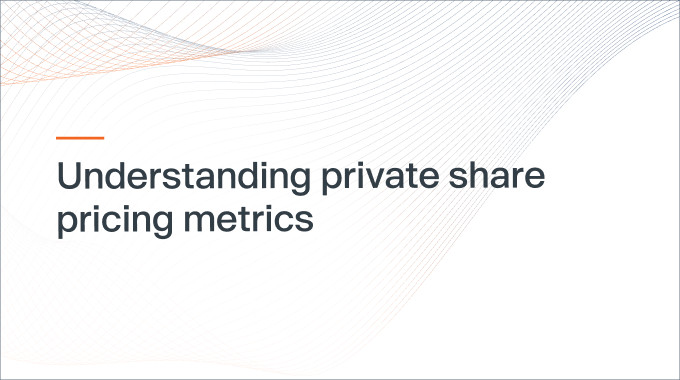Pricing strategies: How to set an asking price for your private shares
Selling private shares is a nuanced process that requires careful consideration, especially when attempting to set ‘the right’ asking price. Unlike public equities, private shares often lack a transparent market price, making valuation efforts more complex. However, with the right strategies and tools, you set a competitive asking price that attracts potential buyers.
Understanding the nature of the private market landscape
Private shares are inherently less liquid than their public counterparts. This limited liquidity stems from factors such as limited buyer pools, lack of public financial disclosures and company-imposed transfer restrictions. As a result, pricing private shares requires a different approach than pricing public stocks.
Key factors influencing share pricing
1. Company performance and financial health
Assessing the issuing company's financial health is paramount. Important metrics to consider include: revenue growth, profitability, market share and future prospects for growth. A company demonstrating strong performance and growth potential can justify a higher asking price.
2. Prior funding round(s), recent transactions and active bid and asks within the order book
A company’s prior funding round(s), recent secondary transactions and active order book can further play a significant role in determining share pricing. Valuations established during recent funding rounds offer a benchmark, reflecting what investors have been willing to pay for equity at specific points in the company’s growth. Similarly, data from recent share transactions in the secondary market can provide real-time insights into how the broader investor community currently values the company’s shares. An active order book — which tracks live buy and sell interest on Forge’s platform — can also influence pricing by indicating the strength of demand and supply at various price points.
Together, these factors help sellers and buyers engage in informed price discovery, leading to fairer, more market-aligned transactions. Luckily, Forge’s platform offers incredible data insights, such as Forge Price™ in these areas to help investors navigate the private market.
3. Market conditions and investor sentiment
The broader market environment and investor sentiment can significantly impact share pricing. In bullish markets with high demand for private shares, sellers may command higher prices. Conversely, in bearish conditions, buyers may be more cautious, requiring more competitive pricing.
4. Comparable transactions
Analyzing recent secondary market transactions of similar-situated companies helps provide valuable benchmarks. Identifying companies in the same industry, with comparable sizes and growth trajectories is also helpful. Such comparables can guide sellers in setting a realistic and competitive asking price.
5. Time horizon and liquidity needs
Your urgency to liquidate shares influences pricing strategy. If near-term liquidity is essential, you may need to price shares more competitively to attract quick buyers. If you can afford to wait, you might set a higher price if you believe a potential buyer will be willing to meet your valuation later.
Leveraging Forge Price for more informed decisions
Forge has introduced Forge Price, a proprietary pricing model that provides derived, indicative prices for approximately 200 pre-IPO, venture-backed late-stage companies. This model synthesizes data from secondary market transactions, recent funding rounds and indications of interest on Forge's platform, offering more timely and frequent pricing updates than traditional sources. By utilizing Forge Price, sellers can gain a clearer understanding of their shares' market value, thus enabling more informed pricing decisions.
Best practices for setting an asking price
The following are some best practices when setting an asking price:
- Conduct thorough research: Gather as much information as possible about the private company's financials, recent funding rounds and any available secondary market data. Forge offers tools like Forge Price to help provide
- Consult professionals: If necessary and helpful, engage with financial advisors or other licensed professionals that are experienced in private share transactions to gain insights and guidance. Forge has market professionals that can help guide you on your journey.
- Be transparent: Provide potential buyers with comprehensive information about the shares, including any transfer restrictions or company policies.
- Stay flexible: Be prepared to potentially negotiate and adjust your asking price based on buyer feedback and market conditions.
- Monitor market trends: Keep an eye on the private market landscape, as shifts in investor sentiment or comparable company valuations can impact your shares' desirability and price.
Final thought
Pricing your private shares effectively is both an art and a science—requiring a blend of strategic thinking, market insight and flexibility. While the private market may lack the transparency of the public market, tools like Forge Price and access to experienced professionals can empower you to set a fair and competitive asking price. By grounding your approach in data, staying attuned to market conditions and remaining open to buyer feedback, you’ll be better positioned to unlock value while attracting the right buyer at the right time. With the right preparation, a private share sale can be a strategic step toward achieving broader financial goals.



